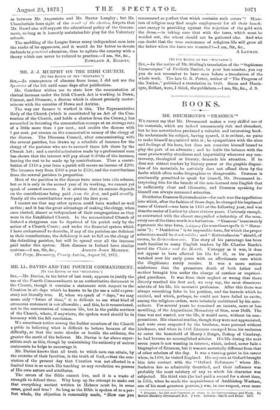MR. J: J. MURPHY ON THE HUSH CHURCH.
[TO TER EDITOR OF TER "SPROTATOR.1
Siu,—In consequence of absence from home, I did not see the Spectator of the 9th until some days after publication. Mr. Gairdner wishes me to state how the commutation of clerical incomes under the Irish Church Act is working in Down, Connor, and Dromore, a diocese which is almost precisely conter- minous with the counties of Down and Antrim.
The way our finance is worked is this. The Representative Body of the Church (which is constituted by an Act of the Con- vention of the Church, and holds a charter from the Crown,) has succeeded in investing the commutation moneys at an average rate of a little more than 4 per cent., and credits the diocese with 4 per cent. per annum on the commutation money of the clergy of the diocese. The Diocesan Council, after communicating with the several parishes, has drawn up a schedule of incomes for the clergy of the parishes who are to succeed those left there by the Church Act ; and a careful calculation made by a professional man has shown that the interest will pay about 9-20ths of the incomes, leaving the rest to be made up by contributions. Thus a contri- bution of £110 a year from a parish will secure an income of £200. The incomes vary from £300 a year to £150, and the contributions from the several parishes iu proportion.
Most of the parishes in the diocese have come into this scheme, but as it is only in the second year of its working, we cannot yet speak of assured success. It is obvious that its success depends on the contributions being paid from the first, and paid steadily. Nearly all the contributions were paid the first year.
I cannot see that any other system could have worked so well as this ; and it has the great advantage of making the clergy, when once elected, almost as independent of their congregations as they were in the Established Church. In the reconstituted Church of Ireland a clergyman can be deprived of his parish only by the action of a Church Court ; and under the financial system which I have endeavoured to describe, if any of the parishes are deficient in their contributions, the deficiency is not to fall on the clergy of the defaulting parishes, but will be spread over all the incomes paid under this system. Most dioceses in Ireland have similar






























 Previous page
Previous page